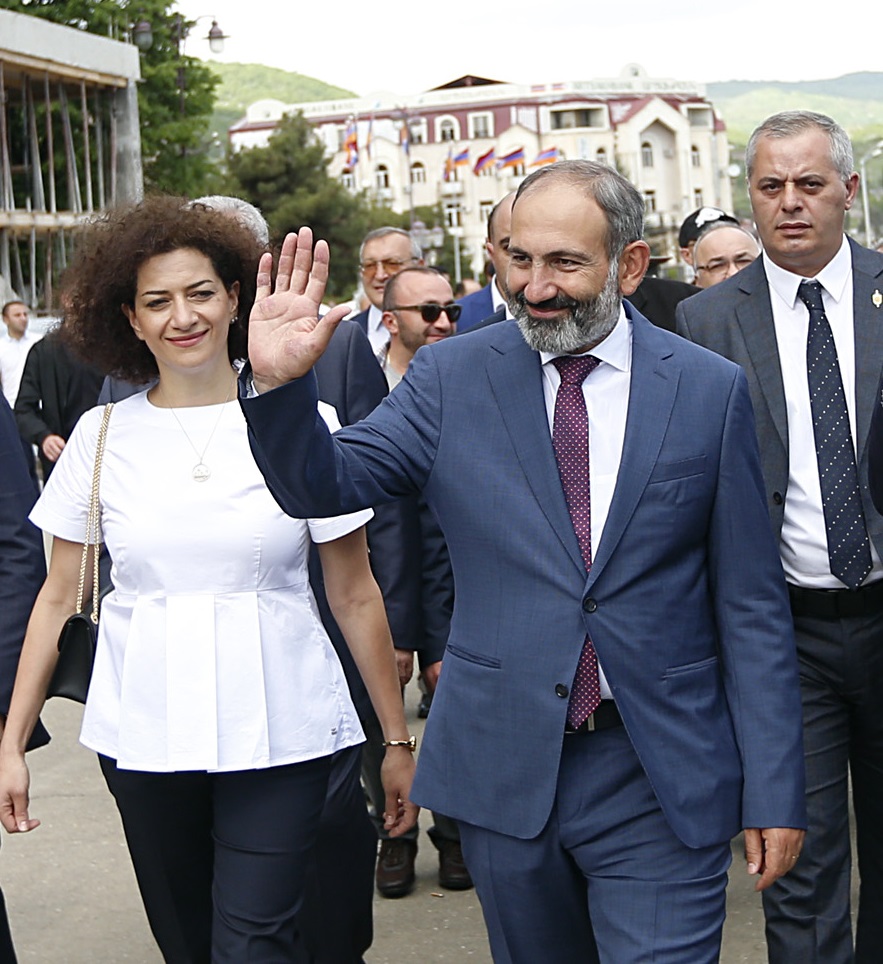
On May 9, the day after he was elected prime minister by Armenia’s parliament, Nikol Pashinyan flew to Nagorno Karabakh to participate in the annual Victory Day events that included the laying of flowers and wreaths at several Stepanakert and Shushi landmarks.
In these visits, Pashinyan was accompanied by Nagorno Karabakh president Bako Sahakyan and chief of the Armenian general staff, Gen. Movses Hakobyan. Both the Nagorno Karabakh leadership and the Armenian military refused to take sides throughout the weeks of intense political crisis in Armenia, precipitated by Serzh Sargsyan’s attempt to stay in power after completing his two presidential terms. Pashinyan in turn sought to underscore Nagorno Karabakh’s importance, traveling there less than 24 hours after taking office.
While in Stepanakert, Pashinyan held his first press conference as prime minister, discussing his views on foreign and domestic issues, outlining his views on the Karabakh conflict and associated negotiations, while seeking to contrast his approach to the former government’s. In particular, Pashinyan said:
“We need to get something straight: do we want to resolve the [Karabakh] conflict or not? If members of the international community, along with Azerbaijan, want to resolve the Karabakh conflict, it does not make sense for the issue to be dealt with in a format that cannot resolve it. How can this negotiations process resolve this issue if one of the parties to the conflict is not at the table? This is not an emotional issue, it is a pragmatic one. Are we trying to resolve the issue or not? Only the leadership of Artsakh can speak on behalf of the Artsakh Republic. Just as only the leadership of the Republic of Armenia can speak on its behalf. The Republic of Armenia is also the party to the conflict and will speak for itself. The Artsakh leadership is supposed to speak for the Artsakh Republic.
“As far as the peaceful resolution of the conflict. Both Armenian parties have always supported a peaceful resolution. But the fact remains that the Azerbaijani side continues with its war rhetoric, which makes it impossible to resolve the issue. You cannot have conflict resolution, if one of the parties is threatening to wipe out the other. Under these conditions we have two things to do. To further strengthen the level of security of the Republic of Armenia and the Artsakh Republic. And second to call on the international to bring Azerbaijan to constructive dialogue. And I believe that Azerbaijan, as well as the international community, must understand clearly that our people will not succumb to these threats, more so when we are united more than ever.
“As long as Azerbaijan’s war rhetoric continues, and [its leadership] talks about taking control of Zangezur, Yerevan, Sevan, Stepanakert, it is pointless to discuss compromises with them. Talk of compromise only becomes possible when we hear from Azerbaijan a very clear, concrete message that Baku is ready to recognize the Artsakh people’s right to self-determination.
“Today negotiations are in a deadlock, I am offering a way out of this deadlock,” Pashinyan argued.
Further, while Armenia is ready to continue negotiations in the OSCE Minsk Group format, Pashinyan said that his government will at the same time seek international recognition of Artsakh.
“The Artsakh issue is about defending human rights. The conflict began, when the Azerbaijani government not only failed to defend the rights of the Armenian residents of the Nagorno Karabakh Autonomous Oblast, but also posed a direct threat to their rights to life and safety, to their identity. The very existence of the Artsakh people was threatened and it was threatened not just through mere rhetoric, but concrete actions, including military attacks against civilian population.
“I look forward to those international non-governmental organizations that deal with human rights, civil society issues to finally become actively engaged with Artsakh’s society since without such engagement they would not be able to understand the realities of the Karabakh conflict. By failing to engage, such organizations effectively join in Azerbaijan’s blockade of Artsakh, which has negative consequences for the credibility of these organizations, as well as for the human rights situation in Artsakh and opportunities to work towards resolution of the Karabakh conflict.
“We need to do a better job explaining the nature of the Karabakh conflict internationally. Particularly, after the April [2016] war, when Azerbaijani armed forces committed the sort of inhumane and savage acts that reflect the actual origin of this conflict. The conflict originally began when the people of Nagorno Karabakh rose up to defend themselves against these types of savage acts.”
The latter issues have been raised by Nagorno Karabakh’s ombudsman Ruben Melikyan, who also prepared a report detailing the war crimes committed in April 2016. Currently, a number of complaints related to these crimes are awaiting consideration at the European Court of Human Rights.
Finally, “when it comes to reunification of Armenia and Artsakh, Artsakh’s international recognition is one of the paths to this [reunification]. Once the Artsakh republic has international recognition, people of Artsakh and of Armenia will have the opportunity to represent their will and their position with regard to their future status.”
Addressing the mass rally of his supporters in Yerevan on May 2, then prime ministerial candidate Pashinyan pledged that “Nagorno Karabakh will become an inseparable part of the Republic of Armenia.”










